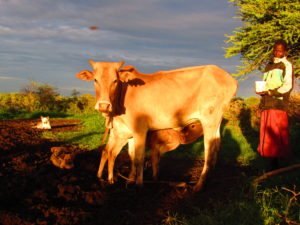Dates: 2014 – 2018
Livestock, Livelihoods and Health is an interdisciplinary research programme exploring diseases that can be transmitted from wild or domesticated animals to people (zoonoses). These diseases, as well as affecting the health of people and animals, can damage development prospects and add to the poverty burden of developing countries.
The programme is undertaking three inter-connected research projects exploring zoonoses in Arusha region, in northern Tanzania. These seek to increase our understanding of:
- The social, environmental and economic factors causing three zoonotic diseases (brucellosis, Q fever and Rift Valley fever) in livestock and people.
- Disease risk from meat, especially from Campylobacter and non-typhoidal Salmonella.
- The spread and control of brucellosis.
The aim is to provide the evidence base to inform new strategies for zoonotic disease control and elimination. Dr Linda Waldman is leading the STEPS Centre research for the programme, which is led by the University of Glasgow.
 The programme is funded under the Zoonoses and Emerging Livestock Systems (ZELS) programme, a joint initiative between the UK Department for International Development, the Biotechnology and Biological Sciences Research Council, Economic and Social Research Council, Medical Research Council, Natural Environment Research Council and the Defence Science and Technology Laboratory.
The programme is funded under the Zoonoses and Emerging Livestock Systems (ZELS) programme, a joint initiative between the UK Department for International Development, the Biotechnology and Biological Sciences Research Council, Economic and Social Research Council, Medical Research Council, Natural Environment Research Council and the Defence Science and Technology Laboratory.
Find out more at the Livestock, Livelihoods and Health website 

